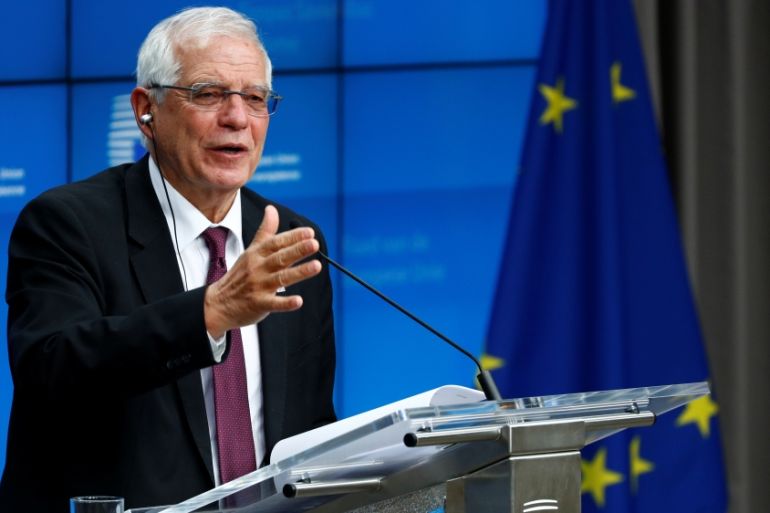Fearing nuclear proliferation, Europe works to calm Iran tensions
At emergency meeting, European Union foreign ministers do not consider triggering dispute resolution under nuclear deal.

EU foreign ministers backed away from any immediate response to Iran‘s decision to intensify its enrichment of uranium, instead repeating their call for Tehran to respect the limits of a 2015 nuclear arms control accord.
At an emergency meeting in Brussels on Friday amid soaring US-Iran tensions, the officials – including NATO Secretary-General Jens Stoltenberg – did not consider triggering a dispute resolution process that could lead to renewed United Nations sanctions on the Islamic Republic.
Keep reading
list of 3 itemsIran aviation chief rejects claim missile downed plane
European diplomats not giving up on Iran nuclear deal
“The region cannot afford another war, we call for an urgent de-escalation and maximum restraint,” EU foreign policy chief Josep Borrell told reporters following the meeting.
Borrell, who chaired the rare emergency meeting, sought to calm tensions by reaffirming the bloc’s commitment preserving the Joint Comprehensive Plan Of Action (JCPOA).
The 2015 Iran nuclear deal has been under mounting pressure since President Donald Trump withdrew the United States from the accord in 2018, demanding tougher curbs on Tehran.
Iran has been gradually discarding the deal’s limitations on its enrichment of uranium for nuclear fuel since, and announced on Sunday it was scrapping all curbs following the US drone strike that killed Iranian commander Qassem Soleimani last week.
“We haven’t discussed whether [the dispute resolution process] should be triggered or not,” Borrell said.
Tehran has said its steps away from the agreement are reversible if Washington returns to the deal and lifts sanctions that have throttled much of Tehran’s lifeblood oil trade.
The United Kingdom, France and Germany – the European powers that are party to the deal – along with China and Russia have desperately tried to pressure Iran to stick to it.
At the same time, Europeans also want to convince Trump, who on Wednesday called on them to join him in withdrawing from the nuclear deal, that they are tough-minded allies who will not be deceived by Tehran.
“We have been saying in the past and we continue to say that we regret the US decision to withdraw from the deal,” Borrell said. “And we continue believing that this deal is a key element of the global nuclear non-proliferation architecture and critical for the regional stability.”
“So, we call on Iran to go back to full compliance with the JCPOA without delay and we rely on the International Atomic Energy Agency to continue to monitor and verify Iran’s activities.”
Al Jazeera’s Natacha Butler, reporting from Brussels, said: “EU leaders will do anything they can to try and maintain that deal. They have been battling to save that deal since 2018.”
Not the time
Iran has repeatedly denied its nuclear programme has military rather than civilian ends.
But it has breached many of the restrictions meant to increase the amount of time Tehran would need to accumulate enough fissile material for an atomic bomb from two to three months to about a year.
The latest announcements could start reducing that time and the three European powers are eager to send a firm message.
They had agreed to begin the dispute resolution process under the 2015 deal that could lead to renewed UN sanctions on Tehran, but have hesitated on the timing fearing Iran may react badly, given its current confrontation with Washington.
“We were planning to do so, but now it would be seen as an escalatory measure. We still need to focus minds, but it’s probably coming soon,” a EU diplomat said before Friday’s emergency meeting.